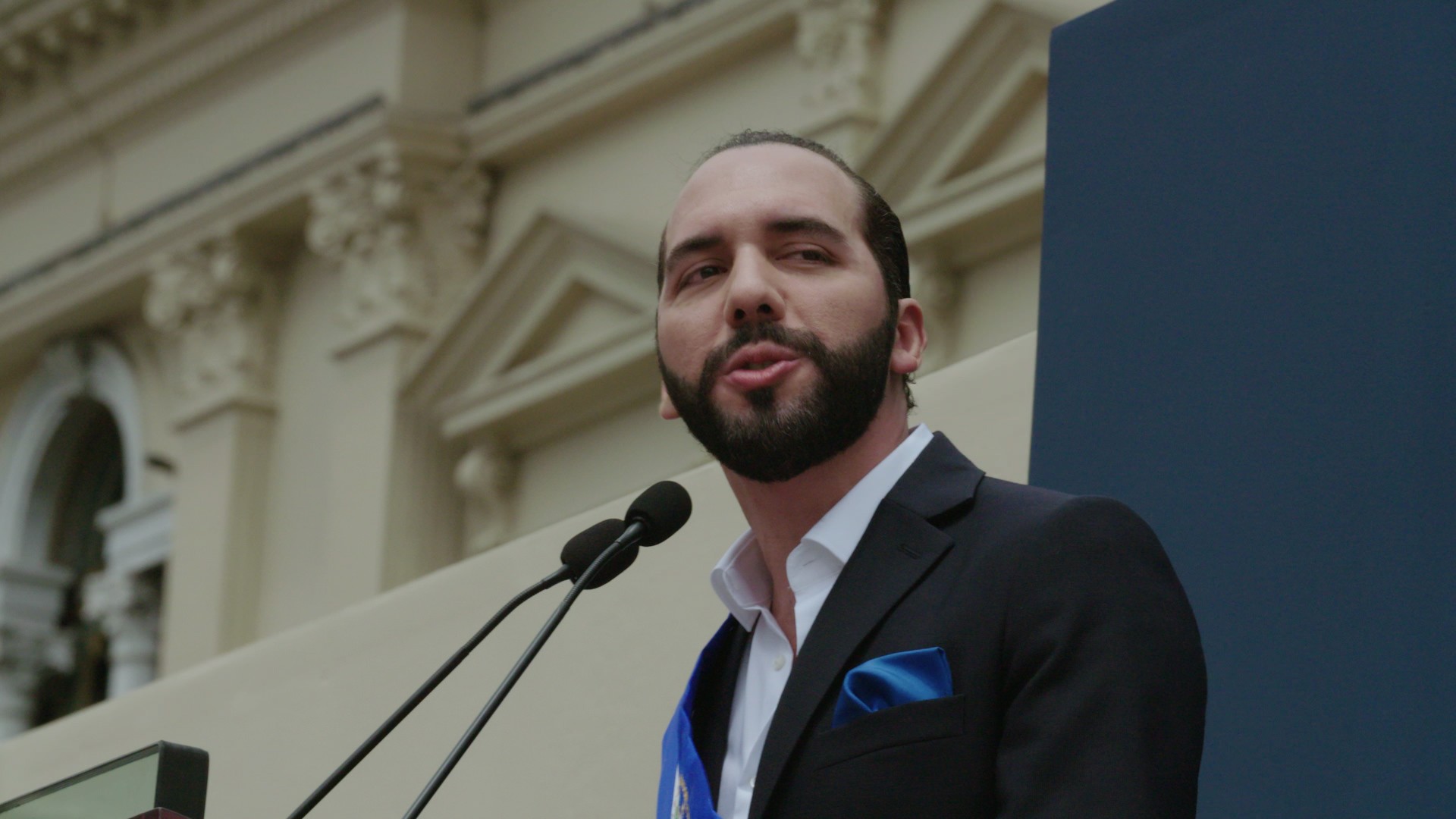A member of the MS-13 gang attends a class in Chalatenango prison in March 2019. Photo by MARVIN RECINOS/AFP via Getty Images.
SAN SALVADOR, El Salvador — The government of Salvadoran President Nayib Bukele tried to bury evidence of meetings it held with leaders of the MS-13 and Barrio 18 gangs to negotiate reduced homicides in El Salvador, according to a report by local digital outlet El Faro. In February 2020, Bukele tweeted that truces negotiated by previous Salvadoran governments had been done with "the blood of our people." But over the past 10 months, Bukele's own alleged negotiations with the gangs have become a national scandal."Shortcuts like this are usually fragile, and breaking them can trigger an escalation of violence in the population that ends up killing people,” said Jannette Aguilar, a Salvadoran researcher specializing in violence.Bukele's government went to great lengths to try to hide the proof of the same kind of meetings he had sharply condemned, according to El Faro’s recent investigation, which was published last week.The alleged suppression of evidence happened after El Faro published an investigation last September describing an apparent pact that had been negotiated between the Bukele administration and the gangs in a maximum-security prison in Zacatecoluca. Bukele denied any negotiations at the time and said that the documents El Faro published as evidence of the pact were fake. In the aftermath of the report, El Salvador’s director general of prisons, Osiris Luna, entered the prison and confiscated logbooks and hard drives containing records of the encounters between gang members and officials, according to El Faro’s latest story, which cited an investigation by the attorney general. Luna was one of four Salvadoran current government officials included in the U.S. government’s "Engel List,” released on July 1, that named officials and former officials from El Salvador, Guatemala, and Honduras accused of corruption.The investigation into the alleged pact between the Bukele government and the gangs was initiated by the office of Attorney General Raúl Melara after El Faro’s first report, but Melara was suddenly dismissed on May 1—the first day that legislators from Bukele's party took their seats in congress after winning landslide midterm elections earlier this year. The new prosecutor, Rodolfo Delgado, appointed the same day, dissolved the unit that led the investigation, El Faro reported. But before that, the outlet said, investigators created a report with their findings, the basis for this week’s story. The file contains documents, photographs, and audio recordings of gang members talking about meetings with officials. Two days after Luna’s September prison visit, El Faro reported, agents from the attorney general’s office raided several prisons, including Zacatecoluca, in search of evidence of the reported gang pact. During the raid, the agents seized videos that showed Luna entering the prison and logbooks noting that he had taken hard drives, as well as additional videos where he entered the prison accompanied by alleged gang members and other government officials. Among the main revelations of the investigation, El Faro published what's known as a “wila”—gang slang for the handwritten messages that come out of the prisons—in which MS-13 and the two factions of Barrio 18 make their requests to the government in exchange for maintaining the reduction in homicides. This wila presents 14 demands to improve conditions inside the prisons and five more to improve the lives of gang members who are not jailed and those of their families, El Faro said. Among the gangs’ demands are an assurance that their rights are respected within the prisons and that transfers to less-secure prisons be granted to those who’ve already served part of their sentence. They also ask for special reintegration programs for released gang members, the creation of cooperatives, micro and small businesses for their members, and higher-education scholarships for their children, according to the digital outlet. Under Bukele's government, the number of homicides have plummeted to historic levels, lower than those during the truce that the government of former President Mauricio Funes established with the gangs between 2012 and 2014. In 2018, before Bukele's victory at the polls the following February, El Salvador averaged 9.2 daily homicides and that number fell to 6.6 a day in 2019. This year, the country is averaging three murders a day, according to numbers provided to VICE World News by the National Civil Police. Arrests of MS-13 gang members have dropped dramatically under Bukele’s government, according to a recent report by Russia Today. Citing data from the National Civil Police, the report stated that the daily number of gang arrests had fallen from 43 a day in 2018 to an average of 25 a day this year. Days before Bukele took office on June 1, 2019, Salvadoran magazine Factum published an interview with an MS-13 leader who claimed to speak on behalf of the entire gang leadership and said that they trusted "in God and in Nayib Bukele."Luis Enrique Amaya, an international consultant and researcher on citizen security, said Salvadorans largely reject any effort to negotiate with gangs."In recent years, the different governments and political parties, although they recognize the power that gangs have in multiple communities, neighborhoods, and barrios, have resisted assuming the political costs of activating transparent channels of communication with these groups,” he said. Amaya believes that it is because “Salvadoran society, if it had to choose, would rather punish the gangs than solve the problem of insecurity. And the two are not necessarily the same. So any possibility of negotiation or pact with the gangs, or even a mere exercise of dialogue, is viscerally rejected by public opinion.”Bukele, 40, saw a meteoric political rise in El Salvador that’s been compared to that of former U.S. President Donald Trump for his prolific use of social media, but after El Faro’s latest report, the president was uncharacteristically silent for several hours. Bukele's only tweet was an image of an MS-13 gang member captured and apparently beaten up by police officers, but he sardonically wrote, "The black eye is because he fell off the motorcycle."The next morning, Bukele tweeted a phrase adapting the popular meme "I don't know, Rick, it looks fake" from an American reality-TV show. The president instead wrote: "I don't know Rick, it looks like Soros." El Faro has received funding from U.S. billionaire George Soros' Open Society Foundations. Antisemitic and ultra-right conspiracy theorists often invoke his name to hint at their fabricated plots. Later, the president continued tweeting. This time he called the post a "refrito", or rehash, and said he had already replied to the same allegations as before. "They want us to answer the same rehash, which we have already answered and which they have already published 5 times," he wrote.Óscar Martínez, head of Special Investigations at El Faro and one of the authors of the story this week, told VICE World News that Bukele's ironic and indirect responses “show that he has no articulated response. When this government does not know what to say or cannot determine a strategy to distract, it reacts in this erratic way with a mixture of silence and indirectness.”VICE World News sought the government's response through Bukele’s press secretary, Ernesto Sanabria. Although the WhatsApp messages sent to his cellphone were opened, he did not respond.
Later, the president continued tweeting. This time he called the post a "refrito", or rehash, and said he had already replied to the same allegations as before. "They want us to answer the same rehash, which we have already answered and which they have already published 5 times," he wrote.Óscar Martínez, head of Special Investigations at El Faro and one of the authors of the story this week, told VICE World News that Bukele's ironic and indirect responses “show that he has no articulated response. When this government does not know what to say or cannot determine a strategy to distract, it reacts in this erratic way with a mixture of silence and indirectness.”VICE World News sought the government's response through Bukele’s press secretary, Ernesto Sanabria. Although the WhatsApp messages sent to his cellphone were opened, he did not respond.
Advertisement
Advertisement
Advertisement
Advertisement

